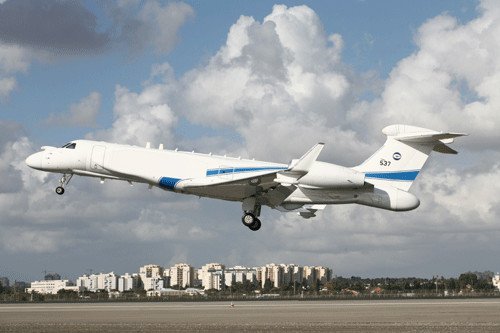The Israel Aerospace Industries CAEW,
via IAI.
TEL AVIV, Israel, March 7 (UPI) -- Israel Aerospace Industries, state-owned flagship of the Jewish state's vaunted high-tech defense industry, is moving toward privatization amid an emerging shake-up of the defense sector.
This includes a possible merger of IAI and two other state-owned companies, Rafael Advanced Defense Systems and the limping Israel Military Industries.
The Economist reports that IAI Chairman Yair Shamir, son of the late Prime Minister Yitzhak Shamir, is the driving force behind the privatization plan.
The Defense Ministry, as well as Israel's Histadrut labor confederation, are reportedly not keen on privatizing a strategically important company that is so central to defense production and Israel's military capabilities while delivering financial benefits. In 2009, IAI paid the government a dividend of $90 million.
"Quite when privatization will come remains uncertain … but for Shamir it cannot come quick enough," The Economist reported.
"Privatization will give IAI currency and flexibility for acquisitions and allow it more discretion over how it spends its Research and Development cash."
Shamir envisages floating 30 percent of the company in an initial public offering and giving another 10 percent in stock options to IAI's 16,000 employees.
"Over five years he expects the government's share to fall to 49 percent," The Economist added.
"He would like to see IAI dual-listed on an international stock exchange, such as Nasdaq, as well as the local TASE."
Shamir took the helm at IAI, Israel's largest industrial concern, in 2005 after he had guided El Al, Israel's national airline, to privatization. He took the job on condition he would be allowed to move IAI in the same direction.
IAI began life as the Bedek Aviation Co. formed by the Israeli government in 1953 to maintain military aircraft. It began building its own aircraft six years later. In 1968, it produced the Nesher, or Eagle, a derivative of Dassault Aviation's Mirage 5. That was followed in 1975 by the Kfir, or Lion Cub.
IAI's main mission has long been to provide Israel's military with the weapons systems to defend the Jewish state. It has developed and manufactured a wide variety of systems, from the Arrow anti-ballistic missile that became the world first operational missile defense system in 2000, to a wide range of unmanned aerial vehicles that are exported to more than 20 countries.
But to keep functioning despite a relatively small national defense budget and to compete with foreign corporations many times its size, IAI has had to turn to the export market to stay competitive.
These days, Shamir says, some 80 percent of IAI's revenues come from foreign sales, such as a $1.1 billion 2004 deal with India for the Phalcon early warning aircraft.
Indeed, Asia is its biggest market. A similar Phalcon contract with China was scrapped after the U.S. government blocked it.
The official reason was that U.S. components were used in the system but the bottom line was the Pentagon didn't want China to obtain AWACS capability.
Problems with the United States were also behind IAI's drive to develop the delta-wing Lavi advanced combat aircraft, a prestige project launched in 1980. It was scrapped in August 1987, ironically by a government headed by Shamir's father, because of financial problems.
The Americans had provided 40 percent of the $6.6 billion financing and said they couldn't afford the project. But they didn't want to fund a jet that was going to compete with Lockheed's F-16C/D Falcon or Boeing's F/A-18C/D Hornet.
However, the technology developed for the Lavi played a key role in the launch of Israel's first satellite into space in 1988 and developing advanced electronic systems now used in Israel's military aircraft.
IAI reported in November that it had an orders backlog of $9 billion and attributed its improved financial condition to new foreign orders.
In December, the defense and finance ministries, along with the Histadrut, proposed merging IAI with Rafael and IMI as a way to salvage IMI which was having serious problems at the time, largely because of efforts to privatize it.
The merger would create the 20th largest defense company in the world that could compete better against foreign conglomerates. No decision has been made on this but it could impede Shamir's hopes of privatizing IAI.















